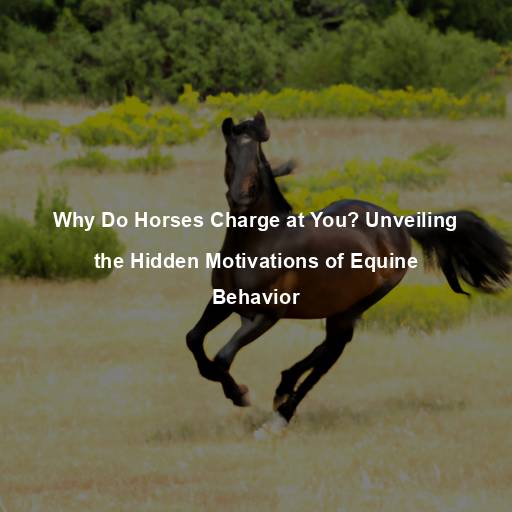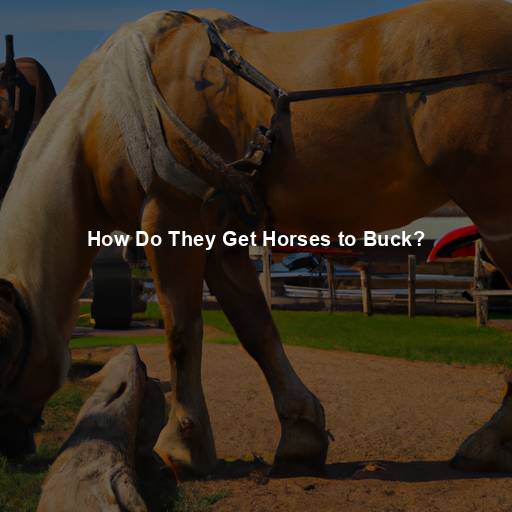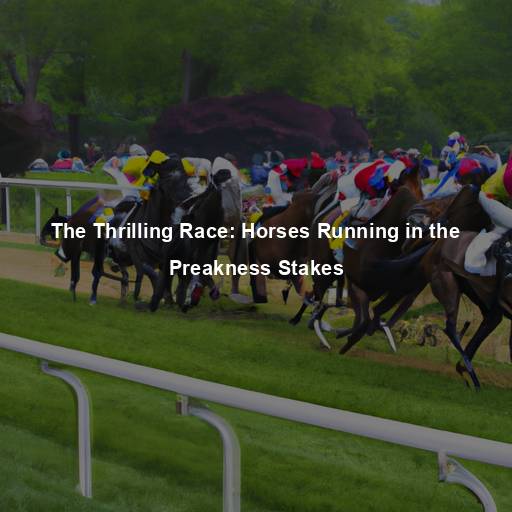Why Do Horses Charge at You? Unveiling the Hidden Motivations of Equine Behavior
Last Updated on July 16, 2023 by Evan
Contents [hide]
- 1 Understanding Equine Behavior: A Window into the Horse’s Mind
- 1.1 The Instinctual Legacy: A Glimpse into the Horse’s Ancestral Behavior
- 1.2 Psychological Triggers: Unraveling the Emotional Landscape of Horses
- 1.3 Communication and Body Language: Decoding Equine Expressions
- 1.4 Building Trust and Positive Relationships: The Key to Harmonious Equine Encounters
- 1.5 The Power of Understanding: Nurturing a Bond with Horses
- 1.6 The Importance of Patience: Allowing Horses to Progress at Their Own Pace
- 1.7 Consistency in Training Methods: Clear Expectations for Horses
- 1.8 Understanding Equine Body Language: A Key to Effective Communication
- 2 Seeking Professional Guidance: When to Consult an Equine Specialist
- 3 Promoting Responsible Horsemanship: Educating Horse Owners and Riders
- 4 FAQs: Why do horses charge at you?
Understanding Equine Behavior: A Window into the Horse’s Mind
Horses, majestic creatures that have captivated humans for centuries, possess a complex and multifaceted nature. From their powerful gallops to their gentle nuzzles, there is an undeniable allure in their presence. However, there are times when horses exhibit aggressive behavior, charging at humans seemingly without provocation. This raises a fundamental question: why do horses charge at you?
The Instinctual Legacy: A Glimpse into the Horse’s Ancestral Behavior
Delving into the enigmatic world of equine behavior reveals a captivating tale of evolution and adaptation. Horses, descendants of their untamed forebears, carry with them a rich tapestry of instinctual tendencies. These ancient inclinations, honed over time to ensure survival in the wild, now dance on the periphery of our understanding, occasionally catching us off guard in the realms of domestication. Unraveling the mysterious motivations behind their charged encounters with humans demands an exploration into the annals of their ancestral heritage.
Protective Instincts: Defending Their Territory
Horses are territorial animals, and charging at intruders is an instinctual response to protect their perceived boundaries. When a horse charges at you, it may be signaling that it feels threatened or that you have encroached upon its personal space. Understanding their need for personal boundaries can help foster a more harmonious relationship between humans and horses.
Fear and Self-Preservation: Flight or Fight Response
Fear is an age-old emotion that transcends species, and horses are not immune to its unpredictable grip. When a horse senses danger or senses itself trapped, its innate survival instincts may drive it to respond aggressively. Charging forward can serve as a direct message to deter potential harm and establish boundaries. To effectively manage these situations, it is crucial to understand the telltale signs of fear in horses and create an environment that prioritizes their safety and well-being.
Psychological Triggers: Unraveling the Emotional Landscape of Horses
The enigmatic realm of horses goes far beyond their ancestral lineage, tapping into a labyrinthine emotional labyrinth that shapes their every move. Delving into the intricate web of psychological catalysts that can provoke their charging tendencies unlocks a profound understanding of the inner workings of these majestic creatures.
Pain and Discomfort: A Cry for Help
Horses share a common thread with all living creatures: the ability to feel physical discomfort and pain. It’s no surprise, then, that these majestic beings may exhibit aggression or charge when they are hurting. Unraveling the source of their distress is paramount, ruling out any hidden medical conditions or underlying discomfort that might be fueling their fiery reactions. By teaming up with a trusted veterinarian or equine specialist, the path towards identifying and tackling these issues becomes clearer, paving the way for a happier, healthier equine-human bond.
Past Traumatic Experiences: Lingering Emotional Scars
Horses have remarkable memories and can retain emotional imprints from past traumatic experiences. If a horse has encountered a threatening or traumatic event in the past, it may react defensively when confronted with similar situations. Patience, understanding, and gentle rehabilitation can help horses overcome their emotional scars and rebuild trust.
Communication and Body Language: Decoding Equine Expressions
Horses are remarkable creatures, mastering the art of communication through intricate body language. Delving into their world of nonverbal cues allows us to unravel their intentions and steer clear of stirring their aggression. Embracing their sophisticated system empowers us to forge a deeper connection and peacefully coexist with these majestic beings.
Ears, Eyes, and Tail: Windows to Their Emotions
As equestrian enthusiasts, we often find ourselves entranced by the subtle expressions of our equine companions. Their ears, eyes, and tails become an enigmatic language, hinting at hidden emotions beneath the surface. When a horse’s ears are pinned back, eyes wide with intensity, and tail flicking with rapidity, it’s a telltale sign of agitation or a looming storm of aggression. On the other hand, when their ears are relaxed, eyes soft with serenity, and tail swaying gently like a summer breeze, we witness the tranquil symphony of a contented horse.
Personal Space and Boundaries: Respecting Their Comfort Zone
When it comes to horses, respecting their personal space and boundaries is absolutely crucial! They have their own comfort zones that we must honor, as invading those spaces without permission can really rattle them. It’s important to approach these majestic creatures with a sense of caution and let them make the first move towards contact. This allows for the development of trust and paves the way for wonderful interactions.
Building Trust and Positive Relationships: The Key to Harmonious Equine Encounters
In the realm of equine companionship, building a genuine bond with our majestic four-legged friends takes precedence. It is imperative to tread cautiously, armed with trust as our steadfast companion and a beacon of equanimity. With diligence and care, we can chart a course towards harmonious coexistence, ensuring the fiery embers of conflict or disorder never ignite in our equine interactions.
Proper Training and Socialization: Laying the Foundation
Thorough training and socialization play a vital role in shaping a horse’s behavior. A well-trained horse is more likely to exhibit desirable traits and respond appropriately to stimuli. Working with experienced trainers and providing horses with opportunities for positive social interactions can significantly contribute to their overall well-being.
Consistency and Clear Communication: Establishing Boundaries
Consistency is key when working with horses. Clear communication, using both verbal and nonverbal cues, helps horses understand what is expected of them. By setting firm but fair boundaries and consistently enforcing them, we create an environment that fosters trust and mutual understanding.
Positive Reinforcement: Encouraging Desirable Behavior
When it comes to cultivating the best behavior from our equine companions, positive reinforcement techniques reign supreme. The allure of rewards and the power of praise wield a formidable influence over our beloved horses, compelling them to forge a positive connection between their actions and the pleasant experiences that follow. By embracing this proactive approach, we can pave the way for greater cooperation and steadfast willingness from our equine partners.
The Power of Understanding: Nurturing a Bond with Horses
To truly understand the enigmatic nature of horses and their tendency to charge at humans, one must explore a myriad of interconnected factors that stem from their evolutionary past, emotional landscape, and unique forms of communication. By delving into the intricate tapestry of equine behavior, we uncover a puzzle waiting to be solved. Armed with this puzzle, we can approach these majestic animals with a profound appreciation for their distinct needs and desires. Through patient and consistent training that fosters trust and utilizes positive reinforcement, we can unlock the potential for a profound connection, discovering the true essence of the human-equine bond.
The Importance of Patience: Allowing Horses to Progress at Their Own Pace
Horses, magnificent creatures embodying individuality, demand a delicate and empathetic handling during their training sessions. Hastening the process or compelling them into uncharted territories triggers anxiety within their majestic souls, translating into potential displays of aggression like untamed charging. Nurturing their progress in accordance with their own rhythm fosters a bond of trust and establishes an atmosphere conducive to fruitful learning.
Consistency in Training Methods: Clear Expectations for Horses
Creating a stable foundation is paramount when it comes to equine training. Horses are creatures of habit, finding comfort in predictability and well-defined boundaries. When our methods waver in consistency, it can befuddle these majestic animals, causing immense frustration that might even trigger displays of aggressive charging. However, by adhering to a steady training routine and employing distinct cues and signals, we offer our equine companions the essential stability they crave for maximum growth and development.
Understanding Equine Body Language: A Key to Effective Communication
The intricate world of equine body language holds a treasure trove of wisdom, unveiling the innermost thoughts and emotions of these majestic creatures. Taking the time to decipher the subtle cues that horses gracefully unveil allows us to delve into their minds and grasp their intentions with utmost precision. This invaluable comprehension acts as a powerful shield, warding off any potential misunderstandings that may provoke the fiery temperament of these magnificent beings.
Reading Facial Expressions: Eyes and Nostrils
When it comes to understanding the emotional world of horses, their eyes and nostrils serve as gates to a realm of mysterious expressions. The expansiveness of their gaze and the flare of their nostrils can be like enigmatic whispers, revealing moments of fear or heightened anticipation. Conversely, the serenity in their eyes and the softness of their nostrils can paint a picture of tranquility. By delving into the depths of their equine visage, we can unlock the complexity of their emotions, allowing us to respond and connect in a way that resonates with their ever-changing moods.
Assessing Body Posture and Movement
A horse’s body posture and movement also provide important insights into their emotions. A stiff, tense posture may signal discomfort or anxiety, potentially leading to charging behavior. Conversely, a relaxed and fluid movement indicates a more contented and relaxed state. By paying attention to these cues, we can better understand a horse’s needs and tailor our interactions accordingly.
Seeking Professional Guidance: When to Consult an Equine Specialist
Understanding the Limitations: The Importance of Professional Expertise
Understanding equine behavior is a fascinating journey, but it’s crucial to respect our boundaries and acknowledge what we still have yet to discover. If we find ourselves in a perplexing situation where a horse’s charging behavior becomes persistently troublesome or dangerous, seeking assistance from a seasoned equine specialist or behaviorist is undoubtedly our best course of action. Their expertise and wealth of experience in assessing such scenarios can provide the much-needed clarity and guidance in navigating these challenging circumstances.
Identifying Underlying Medical Issues: The Role of Veterinary Care
Sometimes, charging behavior in horses may stem from underlying medical conditions. Pain or discomfort can lead to heightened aggression as horses attempt to protect themselves. In such cases, it is crucial to involve a veterinarian who can conduct a thorough examination to identify any physical issues contributing to the behavior.
Addressing Past Trauma: Equine Rehabilitation Programs
Horses that have experienced trauma or abuse may exhibit charging behavior as a result of their past experiences. Equine rehabilitation programs, led by professionals experienced in working with traumatized animals, can provide the necessary support and guidance to help horses overcome their emotional scars. These programs focus on building trust, providing a safe environment, and gradually reintroducing positive interactions.
Promoting Responsible Horsemanship: Educating Horse Owners and Riders
Education and Awareness: The Key to Responsible Horsemanship
When it comes to the realm of horse companionship, knowledge is the noble steed that leads us towards responsible horsemanship. This noble pursuit begins with an insatiable curiosity for the intricacies of equine behavior, training methodologies, and the sacred art of caring for these majestic creatures. Armed with this wisdom, horse enthusiasts can forge a harmonious bond with their equine counterparts, cultivating an environment that transcends mere safety and embraces the poetry of trust. By savoring the enigmatic nuances of horses, individuals will navigate the tapestry of charging incidents with a grace both breathtaking and bewitching.
Training Programs and Workshops: Enhancing Equine Knowledge
Delving into a world of equine education can unlock a treasure trove of wisdom, allowing horse enthusiasts to experience a transformative journey. From deciphering the nuanced language of horse behavior to mastering the art of training, these immersive workshops and training programs offer a gateway to a deeper understanding of our majestic equine friends. By embracing these opportunities for personal growth and enlightenment, equestrians can nurture a profound connection with their beloved steeds, creating a symphony of safety and harmony in their equine interactions.
FAQs: Why do horses charge at you?
Q: Why do horses charge at people?
Horses have their fair share of reasons why they may decide to give people an unexpected chase. The world of horses is as complex and unpredictable as it gets. When faced with fear or a perceived threat, horses resort to a primal instinct known as their flight response, sometimes resulting in charging as a means of self-defense or survival. It’s important to note that improper handling, inadequate socialization, or even underlying health problems can contribute to a horse’s aggressive tendencies. Likewise, protective maternal instincts or a strong territorial nature can also trigger these charging episodes in order to safeguard their foals or establish dominance over their territory. In short, the intricate dynamics of a horse’s behavior leave much room for surprises and perplexity.
Q: How can fear cause a horse to charge at you?
Horses are highly sensitive animals and can easily get scared by sudden movements, loud noises, unfamiliar objects, or unfamiliar people. When a horse feels frightened, their natural response is to either flee or fight to protect themselves. Charging can be a result of their fight response, where they perceive a threat and decide to confront it rather than run away. It’s important to approach horses with caution, especially if they seem nervous or anxious, as unexpected actions or sudden movements may trigger this fear-based charging behavior.
Q: Can improper handling make a horse charge?
It’s no secret that horses can be quite unpredictable creatures. Their reactions to certain situations can leave even the most experienced horse owners scratching their heads in perplexity. One such behavior that often leaves people feeling startled and confused is when a horse charges at them. This burst of aggression can be attributed to a variety of factors, such as improper handling, lack of socialization, or traumatic events. To avoid such distressing encounters, it’s important to provide horses with consistent and gentle training, earn their trust through positive reinforcement, and seek professional guidance when facing behavioral challenges. By doing so, you can create a harmonious bond with your equine companion and minimize the chances of an unexpected charge.
Q: Are there any warning signs before a horse charges?
Horses, fascinating creatures of immense strength and beauty, possess an array of subtle yet vital communication tools that can puzzle even the most experienced equestrians. One might observe a horse with pinned ears, a raised tail, or teeth exposed, all signs of unease or potential aggression. Additionally, the horse may adopt a tense posture, stomp the ground, emit snorts or excessive vocalizations, or fixate its gaze on a particular object or person. These seemingly perplexing behaviors signify discomfort or defensive instincts within the horse, and should not be disregarded lightly. In such situations, it is imperative to offer the horse ample space, steer clear of sudden movements or loud disturbances, and diligently evaluate the environment for potential triggers. Failure to do so may inadvertently ignite further distress in the horse, heightening the risk of an impending charge.
Q: Can health issues provoke a horse to charge?
Yes, certain health issues or physical discomfort can cause a horse to charge. Horses may exhibit aggressive or defensive behavior if they are experiencing pain, discomfort, or are in poor health. In such cases, the pain or discomfort can make them more reactive and less tolerant of human interaction. It is important to regularly monitor a horse’s health, promptly address any medical concerns, and work closely with a veterinarian to ensure their physical well-being. By maintaining their health, we can reduce the likelihood of charging incidents rooted in discomfort or pain.
No two horses are alike, each possessing their own quirks and idiosyncrasies shaped by a complex interplay between their personal history, education, and surroundings. By delving into the depths of their primal instincts, employing suitable methods of handling, and ensuring consistent medical attention, one can forge a bond of trust and security with these awe-inspiring creatures. A profound understanding of their uniqueness is key in unraveling the enigma that is the equine world. Embrace the mystery, and embark upon an extraordinary journey alongside these majestic beings.







